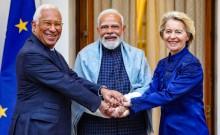When Islamic State (Isis) swept into the northern Iraqi town of Sinjar in 2014, a few young Yazidi women took up arms against the militants attacking women and girls from their community. Haseba Nauzad, the units 24-year-old commander, lost her marriage. She was living with her husband in Turkey when IS (Daesh) swept through northern Iraq and announced its so-called caliphate over areas that included traditional Kurdish lands.
We saw them acting in an extremely criminal way. They were harming people. They were killing people. They were beheading and they forced the girls to perform sexual acts. Therefore, as a Kurdish girl, I saw they were raping my Kurdish sisters, I couldnt accept this injustice, Nauzad said.
Her husband wanted to pay human smugglers to take them to Europe along with more than a million others fleeing conflict in the region, but she insisted on going home to fight the Islamists.
She has lost contact with her husband since he arrived in Germany. In a conservative society where women are often expected to stay at home, these women say gender does not keep them from entering battle.
If a man can carry a weapon, a woman can do the same, said Nauzad. The men are inspired to fight harder when they see women standing in the same battlefield as them.
The women in the unit are convinced IS militants are scared of women fighters because they think if they are killed by a woman, they will not go to heaven, said Nauzad.
IS has hounded ethnic and religious minorities in northern Iraq since seizing the city of Mosul in June 2015, killing and displacing thousands of Christians, Shiite Shabaks and Turkmen who lived for centuries in one of the most diverse parts of the Middle East. Hundreds of Yazidi women and girls were captured, raped and tortured, and forced to convert to Islam and marry Islamic State followers, according to rights groups.
This treatment prompted the formation of this unusual 30-woman unit made up of Yazidis, as well as Kurds from Iraq and neighbouring Syria. For them, only one thing matters: revenge for the women raped, beaten and executed by the jihadist militants.
IS considers the Yazidis to be devil-worshippers and says they must convert to Islam or die. The Yazidis, thought to number several hundred thousand in Iraq before they came under attack by IS, are mostly Kurdish speakers whose ancient religion has elements of Zoroastrianism, Christianity and Islam. IS says enslaving Yazidis is the revival of an ancient custom of using women and children as spoils of war.

















